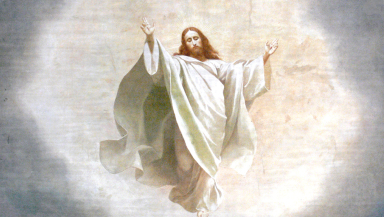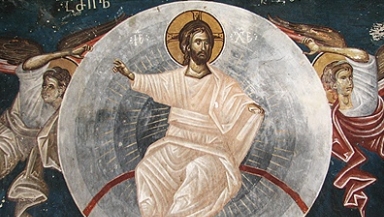Today is Ascension Day, when the Church celebrates Jesus' ascension from earth into heaven.

It's actually a quite baffling story.
The account in Luke 24:50-53 says:
'When he had led them out to the vicinity of Bethany, he lifted up his hands and blessed them. While he was blessing them, he left them and was taken up into heaven. Then they worshipped him and returned to Jerusalem with great joy. And they stayed continually at the temple, praising God.'
It seems a quirky inclusion. The gospels have otherwise emphasised Jesus' fully human, grounded existence. But now it seems he can fly? It also appears to imply that heaven is just above the clouds, which we know not to be true. And yet Jesus' ascension is not simply an eccentric moment in Luke's account – it's a central part of the Christian story, affirmed as orthodoxy across the New Testament and in the early Church creeds. So why do we need it?
1. 'You gotta go there to come back'
Jesus' heavenly ascent can feel as though it's setting heaven above against earth below – but there's more going on. Jesus leaves, but his departure isn't final, nor is it a high-flying dismissal of earthly transience.
In the Acts account of the ascension, Luke writes:They were looking intently up into the sky as he was going, when suddenly two men dressed in white stood beside them."Men of Galilee," they said, "why do you stand here looking into the sky? This same Jesus, who has been taken from you into heaven, will come back in the same way you have seen him go into heaven."'
As the Stereophonics put it, 'You gotta go there to come back'. Jesus is going, but he promises return. This lines up with Christian theology: the Kingdom of God is not about escaping this world to a disembodied existence, but about the redemption of this very broken world. It is for that reason that Jesus assumed humanity in the first place: to heal it, not help us transcend it.
2. One gift for another
Christ's incarnate humanity – God as a living breathing human being that you could know, laugh with, cry with and even kill – was a profound gift to humanity. But the ascension isn't God getting bored with earthly life and floating away. He does leave, but promises another, the Paraclete, 'the comforter' or 'the helper' will take his place. In a sense, God takes away one gift but gives another – and both are himself. The Son departs, but the Holy Spirit, who descends at Pentecost, will be God's Spirit living in the hearts of humankind.
We don't know why exactly this was how it had to be, although God's presence as Spirit, living through the Church, did expand the reach of God's incarnate work on the earth. Jesus spent most of his ministry with 12 men. He calls the worldwide Church, with the help of the helper, to go far further.
3. The great high priest

This shouldn't imply however, that Jesus is napping while the Holy Spirit steps up to do some work. The Holy Trinity is three persons in one, united and working together. Christ's work continues: his ascent to the Father is part of his ministry as the great high priest for humankind, the living sacrifice interceding to the Father. His humanity remains a central to that service.
As Hebrews puts it: 'Therefore, since we have a great high priest who has gone through the heavens, Jesus the Son of God, let us hold firmly to the faith we profess. For we do not have a high priest who is unable to sympathise with our weaknesses, but we have one who has been tempted in every way, just as we are – yet was without sin. Let us then approach the throne of grace with confidence, so that we may receive mercy and find grace to help us in our time of need.'
4. Looking up
The 'mystery of godliness is great', Paul told Timothy, and he was right. Jesus' ascent completed his description of that mystery (1 Timothy 3:16), and that seems fitting. Glory is the key theme – the man who was rejected is now visibly, unmissably rising again. Good has defeated evil, love has conquered, a New Creation is coming: Jesus' rise into the sky, baffling as it may be, gives us a hint of those dramatic realities that we can't yet see.
As we know, we're a generation that spends far too long looking down, often hunched over our handheld screens. Our apps keep us occupied, but do they give us wonder? Jesus's ascension reminds us to instead look up, in more ways than one. Not because he's hiding behind the clouds and might reappear at any moment, but because we're called to live hopefully, yearn for transcendence, and minster wonder to a cynical world. The disciples were moved not to fear and confusion, but joy and praising God. On a day like today, we remember we were made to look up.
You can follow @JosephHartropp on Twitter













